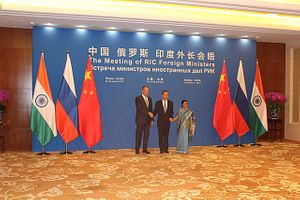A new global order is emerging, though much of its shape is still uncertain. At the very least, many would agree that while the U.S. will remain a great power for many decades to come, its share of global power will decline relative to other rising powers. These other powers, such as China and India, will catch up and play a more active and important role in global affairs. While many analysts have focused their attention on a possible rivalry between China and the U.S., few have paid adequate attention to the dynamic emerging between China, India, and Russia and the possibility of a coalition among them born from their desire to alter the status quo.
On the surface it seems that China, India, and Russia are ill-suited to a partnership. Despite being members of the “BRICS” club, there are many substantive differences between the three countries, particularly between China and India, that will impact how they relate in the decades to come.
Tensions between China and India are obvious. While India is a democracy, China remains an authoritarian regime. Of course, the importance of regime type in interstate relations is debatable. States with different regime types are not necessarily doomed to troubled relations; there is nothing inherent in regime type that inhibits cooperation. Still, many would agree that India, to some degree, sees non-democratic China as a threat; whether or not such a threat perception is grounded in reality is a different issue. The perception alone impacts their relations.
The biggest problem in China-India relations is still the territorial dispute between them. As serious as this problem is, however, the likelihood that this dispute will be resolved is actually higher than many people might think. It has been confirmed that Indian Prime Minister Narendra Modi will visit China in May and there is talk that both China and India would like to make a breakthrough on the issue. China also supports greater Indian involvement at international institutions, including the United Nations. These positive signs mean that there is considerable potential for a closer China-India partnership, despite recent hype about India siding with the U.S. to contain China. Most importantly, what will bring China and India together is their shared dream of becoming first-tier developed countries. In this sense, India can benefit from China’s exports and capital, whereas China can benefit from India’s market and technology potential. It would be a serious mistake for both countries to dismiss their shared long-term interests in favor of present disputes.
The China-Russia relationship is more interesting these days as the Ukraine crisis continues to drive Russia and the West apart. The fundamental distrust between the West and Russia helps drive the ongoing Ukraine crisis. Few are optimistic about the potential of the recent ceasefire deal to settle the conflict and relations between the West and Russia are likely to stagnate for some time. Meanwhile, the China-Russia relationship will get stronger. China can provide economic and strategic stability to Russia, and Russia can stand with China in its ongoing disputes with other Asian countries. At the very least each can be supportive to the other.
From a fundamental perspective, the core reason for a possible China-India-Russia coalition is their common desire to build a multipolar or multiplex global system within which emerging powers like China and India can play a larger role. None of the three countries are content to live under the shadow of U.S. hegemony, though they may not want to directly challenge the U.S. at the moment. As China’s Foreign Minister Wang Yi said in 2013, all three countries should work together to promote the democratization of international relations. If this is true for all three countries, then there is a good reason to consider the possibility of a China-India-Russia coalition in some form in the future. That is not good news for the U.S., which would prefer to maintain its dominant position for as long as possible. The U.S. may seek to counter the coalition with one of its own, with Japan and the E.U. as formal partners.
We are unlikely to see a formal coalition composed of China, India and Russia anytime soon, but we should not rule out the possibility over the long term. All three powers are dissatisfied with the current global order to varying degrees. If the U.S. wishes to avoid such a coalition it should think carefully about how to encourage the redistribution of power at the global level. Beginning the process of sharing power with China and India might be a good start.

































